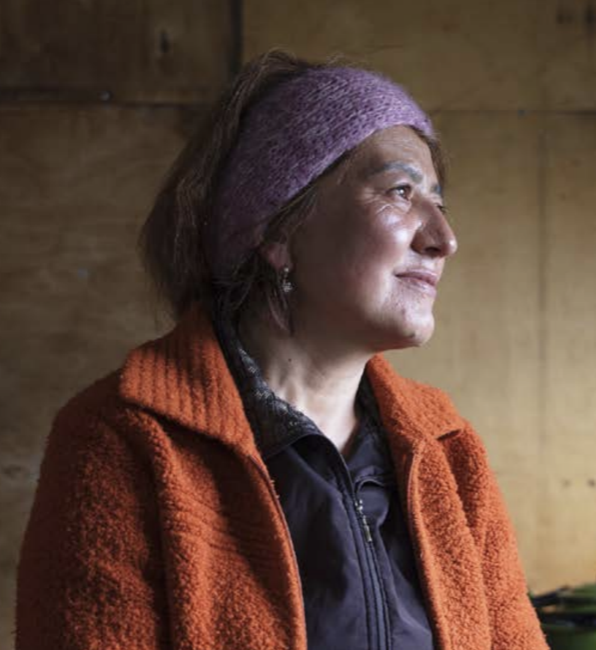Situated at over 3000 metres above sea level sits the picturesque
Song-Kul Lake. While there is no easy route to reaching this breathtaking
destination, the trip is well worth it; similar to the entrepreneurial journey of
Rahima it is one of perseverance and refects a labour of love.
Rahima describes how it is to be a woman in her culture, the extra
effort she invests to succeed at her business, to be-all and do-all in order
to fulfl societal expectations of a woman’s role, and the judgement she
endures at the hands of entitled onlookers.
‘We carry many burdens. There’s the housework, the business and
there’s people’s talk. We take care of the house, we mend the yurts, make
mattresses, bed linen. Then they say, “You just work, you do a man’s job and
you do a woman’s job. Why don't you look after yourself?”
Widowed in 2004 and left with three young children, the challenges
Rahima faced grew tenfold:
‘When my husband passed away I struggled a lot and faced many
problems. I thought a lot, and I worked a lot. I wanted to take care of my
children, I wouldn’t let them feel the absence of their father. I raised and
educated them.’
Through hard work and determination, Rahima not only managed to
get her two older children through university education, she also bought her
own house, cattle, a truck for her son and an SUV that she confdently drove
to pick us up when we couldn’t fnd her yurt camp.
With the generous help and support of her parents and especially her
grandmother who gave her the frst yurt, Rahima started hosting tourists with
CBT Kochkor at Song-Kul Lake in 2009, “My parents and my grandmother
brought me into tourism. When I started my business, I didn’t feel the need to depend on others.” Her business has now expanded from a single yurt to a full-fedged getaway with nine yurts.
Rahima’s business supports her extended family and the women in
her network by providing them with work, “I helped one woman with many
siblings. She worked here, I gave her money, helped with the groceries. My
aunt’s and neighbours’ children also worked for me, I paid them extra, bought
them clothes.”
Rahima’s command of her business is evident, "I’m in charge of
everything. My friends say that I have become a “boss” since I started receiving tourists." However, it has not been easy:
“The frst year I struggled. It was frustrating. I had to learn, people stood
in my way; it took so much to fnd the strength to continue, but I was adamant,
worked hard, attracted clients, and did well.’
Rahima’s eyes light up as she proudly describes what is perhaps her
greatest achievement as an entrepreneur; the impact on her daughter’s
outlook on life, “She no longer sees marriage as the priority in life. She wants
to travel, study and work abroad. Tourism has helped us in more ways than
you can imagine.”
Rahima Bekkaziyeva
